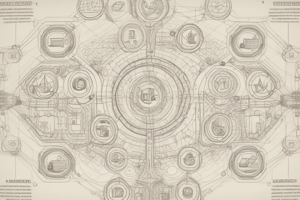Podcast
Questions and Answers
What defines the head of an educational institution?
What defines the head of an educational institution?
- The head must be a government official.
- The head does not have any administrative responsibilities.
- The head is only responsible for student registration.
- The head can be referred to as a principal, director, or school head. (correct)
Which of the following documents are teachers required to submit?
Which of the following documents are teachers required to submit?
- Student performance evaluations and audits.
- Examination copies, class records, and proof of student consultation. (correct)
- Personal teaching philosophies and strategies.
- Budget reports and financial statements.
What encompasses the 'books' that educational institutions are required to maintain?
What encompasses the 'books' that educational institutions are required to maintain?
- Admissions forms and parent communications.
- Files, logbooks, and pertinent administration documents. (correct)
- Only textbooks used in classrooms.
- Annual financial reports and construction plans.
How does the MLS department's curriculum differ from the standard national curriculum?
How does the MLS department's curriculum differ from the standard national curriculum?
What is the primary regulatory authority for educational institutions?
What is the primary regulatory authority for educational institutions?
What primarily distinguishes formal education from informal education?
What primarily distinguishes formal education from informal education?
What is a key characteristic of a vision statement for an academic institution?
What is a key characteristic of a vision statement for an academic institution?
Which of the following best describes informal education?
Which of the following best describes informal education?
What element is crucial for determining the advancement to the next level in a formal education system?
What element is crucial for determining the advancement to the next level in a formal education system?
When finalizing a vision statement, which of the following is a recommended practice?
When finalizing a vision statement, which of the following is a recommended practice?
Which educational structure typically encompasses all age levels from preschool to postgraduate education?
Which educational structure typically encompasses all age levels from preschool to postgraduate education?
What is the typical duration of a formal education year in the Philippines?
What is the typical duration of a formal education year in the Philippines?
Which of the following statements about an educational institution is true?
Which of the following statements about an educational institution is true?
What should be avoided when drafting a vision statement according to best practices?
What should be avoided when drafting a vision statement according to best practices?
What generally characterizes evaluations in formal education systems?
What generally characterizes evaluations in formal education systems?
Flashcards are hidden until you start studying
Study Notes
Educational Institution Overview
- An educational institution is an organized unit, typically led by a principal or director.
- It employs teachers and staff responsible for day-to-day educational activities.
- Must keep systematic records and documentation, including student registrations and academic progress.
- Governed by legal regulations and follows a national curriculum mandated by public authorities.
- The concept transcends physical structures; essence lies in the daily operations performed by staff and teachers.
Structure of Educational Institutions
- Leadership is provided by individuals such as directors or school heads.
- Essential roles include teachers who manage classes and administrative staff who handle documentation.
- Responsibilities of teachers include maintaining examination papers, class records, and student consultation forms.
Curriculum requirements
- The MLS department adheres strictly to the CHED-prescribed curriculum, supplemented with additional subjects like Theology.
- Core and professional subjects are standardized across educational institutions in the country.
Types of Education
Formal Education
- Operates within a conventional classroom setup, requiring physical classrooms and educational materials.
- Instruction is guided by faculty members following a strict curriculum provided by the government.
- Begins around age 4 and spans 10 months, with summer breaks varying by level and institutional type.
- Progression to the next level is contingent upon successful assessments, culminating in graduation ceremonies.
Informal Education
- Takes place outside traditional classroom environments and is more flexible regarding structure and duration.
- Focuses on skill development through practical interaction rather than theoretical knowledge.
- Examples include driving schools, dance classes, swimming lessons, and sports clinics.
Vision and Mission Statement
Vision Statement
- Represents the aspirational goals of an educational institution, defining its future direction.
- Typically concise, memorable, and focused on long-term transformation; aims for social impact beyond the institution itself.
- Should be clear and succinct, averaging around 14 words, guiding strategic decisions and cultural values.
Crafting a Vision Statement
- Consider the future impact on the community, customers, and overall industry.
- Project aspirations 5 to 10 years ahead, focusing on positive outcomes and success rather than failure.
- Use present tense for clarity and ensure language is straightforward to avoid confusion among staff and stakeholders.
Studying That Suits You
Use AI to generate personalized quizzes and flashcards to suit your learning preferences.




